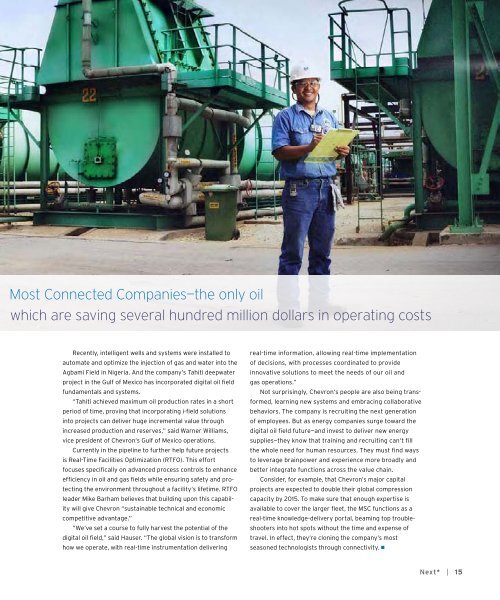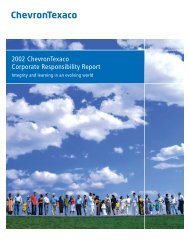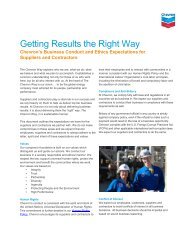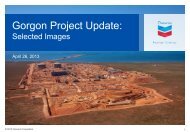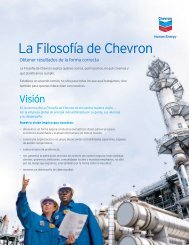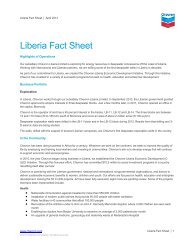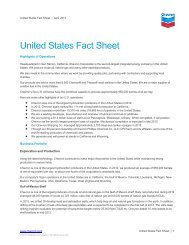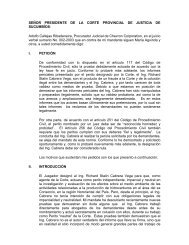Next* Magazine, Issue 5 - Chevron
Next* Magazine, Issue 5 - Chevron
Next* Magazine, Issue 5 - Chevron
Create successful ePaper yourself
Turn your PDF publications into a flip-book with our unique Google optimized e-Paper software.
Most Connected Companies—the only oil<br />
which are saving several hundred million dollars in operating costs<br />
Recently, intelligent wells and systems were installed to<br />
automate and optimize the injection of gas and water into the<br />
Agbami Field in Nigeria. And the company’s Tahiti deepwater<br />
project in the Gulf of Mexico has incorporated digital oil field<br />
fundamentals and systems.<br />
“Tahiti achieved maximum oil production rates in a short<br />
period of time, proving that incorporating i-field solutions<br />
into projects can deliver huge incremental value through<br />
increased production and reserves,” said Warner Williams,<br />
vice president of <strong>Chevron</strong>‘s Gulf of Mexico operations.<br />
Currently in the pipeline to further help future projects<br />
is Real-Time Facilities Optimization (RTFO). This effort<br />
focuses specifically on advanced process controls to enhance<br />
efficiency in oil and gas fields while ensuring safety and protecting<br />
the environment throughout a facility‘s lifetime. RTFO<br />
leader Mike Barham believes that building upon this capability<br />
will give <strong>Chevron</strong> “sustainable technical and economic<br />
competitive advantage.”<br />
“We‘ve set a course to fully harvest the potential of the<br />
digital oil field,” said Hauser. “The global vision is to transform<br />
how we operate, with real-time instrumentation delivering<br />
real-time information, allowing real-time implementation<br />
of decisions, with processes coordinated to provide<br />
innovative solutions to meet the needs of our oil and<br />
gas operations.”<br />
Not surprisingly, <strong>Chevron</strong>‘s people are also being transformed,<br />
learning new systems and embracing collaborative<br />
behaviors. The company is recruiting the next generation<br />
of employees. But as energy companies surge toward the<br />
digital oil field future—and invest to deliver new energy<br />
supplies—they know that training and recruiting can‘t fill<br />
the whole need for human resources. They must find ways<br />
to leverage brainpower and experience more broadly and<br />
better integrate functions across the value chain.<br />
Consider, for example, that <strong>Chevron</strong>’s major capital<br />
projects are expected to double their global compression<br />
capacity by 2015. To make sure that enough expertise is<br />
available to cover the larger fleet, the MSC functions as a<br />
real-time knowledge-delivery portal, beaming top troubleshooters<br />
into hot spots without the time and expense of<br />
travel. In effect, they’re cloning the company’s most<br />
seasoned technologists through connectivity. ■<br />
<strong>Next*</strong> | 15


